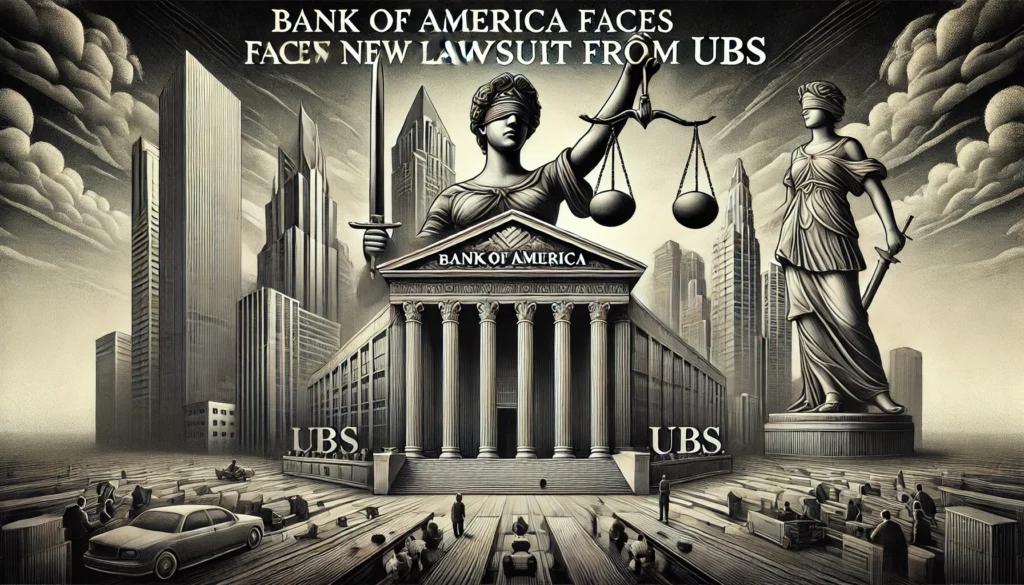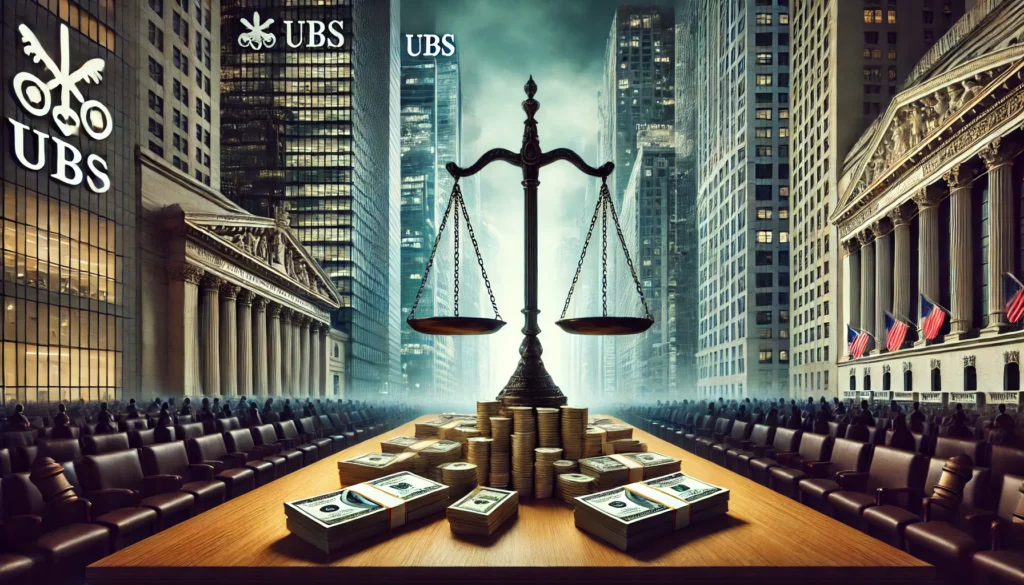The legal landscape in the financial sector has taken a dramatic turn as Bank of America faces a new lawsuit from UBS. The lawsuit reportedly stems from allegations tied to financial misconduct, sparking widespread attention in the banking world.
This latest legal battle highlights growing tensions between major financial institutions and raises questions about industry practices and compliance standards. Both companies now find themselves under the scrutiny of legal experts and regulatory authorities.
As the case unfolds, its potential implications on market dynamics and future regulations remain a key focus for analysts, investors, and stakeholders alike.
Why Bank of America Faces a New Lawsuit from UBS
The lawsuit between UBS and Bank of America stems from disputes over financial dealings that reportedly involved mismanagement and breach of fiduciary responsibilities. UBS claims that certain agreements were violated, prompting legal action.
One of the primary triggers appears to be a transaction where UBS alleges discrepancies in the reporting and handling of assets. Regulatory scrutiny in the financial sector has increased in recent years, and this lawsuit underscores the rising tension among major banks.
UBS’s legal team has emphasized the potential damage caused by these alleged actions, which they argue have undermined the competitive balance in financial markets. This high-profile case reflects broader concerns about accountability in the banking world.
Financial Implications of UBS’s $200 Million Lawsuit Against Bank of America
In July 2024, UBS filed a $200 million lawsuit against Bank of America, alleging that the latter failed to honor indemnification agreements related to pre-2008 mortgage-backed securities issued by Countrywide Financial, which Bank of America acquired in 2008.
Potential Financial Impact on Bank of America:
- Legal Expenses: Defending against the lawsuit could result in substantial legal fees, potentially amounting to tens of millions of dollars.
- Settlement Costs: If Bank of America opts for a settlement, the payout could approach or exceed the $200 million sought by UBS.
- Reputational Damage: The lawsuit may affect investor confidence, potentially leading to stock price volatility.
Bank of America’s Financial Overview (as of Q2 2024):
| Metric | Value |
| Total Assets | $3.1 trillion |
| Net Income | $7.8 billion |
| Legal Reserves | $1.2 billion |
| Stock Price (July 31, 2024) | $28.50 per share |
Considerations:
- Legal Reserves Adequacy: Bank of America’s existing legal reserves may need augmentation to cover potential liabilities arising from this lawsuit.
- Investor Relations: Transparent communication with shareholders is crucial to mitigate concerns and maintain market stability.
- Regulatory Scrutiny: The case may attract increased attention from financial regulators, potentially leading to further investigations or sanctions.
The outcome of this lawsuit could have significant financial and operational repercussions for Bank of America, underscoring the importance of effective risk management and compliance practices within major financial institutions.
Key Allegations in the UBS Lawsuit Against Bank of America
UBS’s lawsuit outlines several key allegations, including claims of misrepresentation in financial transactions and failure to comply with agreed-upon terms. These accusations point to possible breaches in transparency and ethical standards.
Key Allegations by UBS
| Allegation | Details |
| Misrepresentation of Assets | Inaccurate reporting of financial holdings. |
| Breach of Contract | Violation of partnership agreements. |
| Regulatory Non-Compliance | Failure to meet legal and procedural standards. |
The lawsuit also claims that these actions may have contributed to financial instability, impacting both institutions and broader market confidence. Analysts suggest that UBS is seeking not only damages but also a precedent for stricter compliance enforcement in future dealings.
How the Lawsuit Could Reshape the Banking Industry
This legal confrontation could set new benchmarks for transparency and compliance in the financial sector. If UBS succeeds, other institutions may face increased regulatory oversight, compelling them to tighten internal controls.
The lawsuit is likely to influence future legal frameworks governing interbank agreements. It highlights the need for clearly defined contractual terms to prevent ambiguities and disputes. The case could also prompt regulators to revise guidelines for risk management and financial reporting.
- Impact on Innovation: Stricter rules could slow down new financial product development.
- Global Standards: Cross-border banking practices may see a push toward harmonization of laws.
Ultimately, the lawsuit serves as a wake-up call for the industry, reminding stakeholders of the importance of robust governance mechanisms to ensure ethical practices.
Financial Impacts as Bank of America Faces a New Lawsuit from UBS
The financial repercussions of this lawsuit could be significant for Bank of America. Legal costs, potential damages, and reputational harm may weigh heavily on its market performance. Investors often react negatively to such developments, with share prices typically experiencing volatility.
Hypothetical Impact of Legal Costs on Revenue
| Year | Revenue Before Lawsuit ($ Billion) | Estimated Impact ($ Billion) | Revenue After Lawsuit ($ Billion) |
| 2023 | 90 | 5 | 85 |
| 2024 | 92 | 8 | 84 |
UBS, too, may face challenges, as prolonged legal battles can strain resources and distract from strategic objectives. Both entities could experience increased scrutiny from regulators and shareholders, further influencing their operational dynamics.
While the immediate financial impact is concerning, the long-term effects on market perception and investor trust could prove even more consequential for both parties.
Examining UBS’s Legal Strategy in the Ongoing Dispute
UBS has adopted a meticulous approach to its legal strategy, focusing on presenting detailed evidence that supports its claims against Bank of America. By highlighting specific instances of alleged misconduct, UBS aims to strengthen its position in court.
Legal experts suggest that UBS is leveraging precedent cases to build its arguments. This involves citing past rulings that align with the current dispute, potentially influencing the judge’s perspective. UBS’s strategy also includes requesting access to Bank of America’s internal documents, which may reveal critical insights.
Key Legal Tactics UBS is Employing:
- Pursuing discovery requests for financial records.
- Focusing on contractual violations to narrow the scope of arguments.
- Utilizing expert testimonies to validate claims.
This well-rounded approach signals UBS’s determination to achieve a favorable outcome, possibly setting a legal precedent for similar cases in the future.
What Bank of America’s Legal History Tells Us About This Case
Bank of America has faced multiple lawsuits over the years, ranging from regulatory breaches to disputes with corporate clients. Its legal history highlights a pattern of settlements, which suggests a preference for avoiding protracted court battles.
A notable case in its history involved accusations of mishandling mortgage-backed securities during the 2008 financial crisis. The settlement in that case resulted in significant financial penalties but allowed the bank to rebuild its reputation over time.
| Case | Year | Outcome |
| Mortgage-Backed Securities Case | 2014 | $16.65 billion settlement |
| FX Market Manipulation | 2015 | $205 million penalty |
These experiences may influence Bank of America’s strategy in the current lawsuit with UBS, potentially leading to negotiations or a settlement rather than prolonged litigation.
Stakeholder Reactions to the UBS Lawsuit
The UBS lawsuit against Bank of America has elicited varied reactions from stakeholders, including investors, customers, and regulators. Investors have expressed concern over potential financial losses and reputational damage, leading to fluctuations in stock prices for both banks.
 Regulators are closely monitoring the case, as its outcome could influence future oversight policies. Meanwhile, customers have shown mixed reactions, with some questioning the ethical standards of both institutions while others remain loyal.
Regulators are closely monitoring the case, as its outcome could influence future oversight policies. Meanwhile, customers have shown mixed reactions, with some questioning the ethical standards of both institutions while others remain loyal.
Reactions by Stakeholder Group:
- Investors: Skeptical about the financial impact on market value.
- Customers: Divided; some loyal, others critical of bank practices.
- Regulators: Viewing this case as a potential catalyst for stricter rules.
This wide array of responses underscores the significance of the lawsuit, not just for the involved parties but for the broader financial ecosystem.
Potential Outcomes as Bank of America Faces a New Lawsuit from UBS
The lawsuit’s resolution could take several forms, each with distinct implications. A settlement is a likely outcome, as both parties may prefer to avoid the uncertainty and expense of a lengthy trial.
If UBS prevails in court, Bank of America could face substantial financial penalties and reputational harm. On the other hand, a favorable ruling for Bank of America might reinforce its market position but could strain its relationship with UBS.
Another potential outcome involves regulatory interventions. The case may prompt authorities to introduce stricter compliance guidelines to prevent similar disputes in the future, impacting the entire banking industry.
In any scenario, the outcome will significantly shape the perception and operations of both Bank of America and UBS, with long-term ramifications for their stakeholders.
The Last Word
The ongoing lawsuit where Bank of America faces a new lawsuit from UBS marks a pivotal moment in the financial industry. It underscores the critical need for transparency, ethical practices, and robust compliance measures among major players in the banking sector. Both institutions now find themselves navigating not only legal scrutiny but also public and regulatory pressures.
For Bank of America, the stakes are particularly high as the lawsuit could lead to significant financial penalties and reputational damage. UBS, meanwhile, seeks to establish accountability and potentially set a legal precedent for future disputes of this nature. Regardless of the outcome, the case reflects the growing complexities and challenges in managing high-stakes financial transactions.
This legal clash also raises important questions for stakeholders, regulators, and industry observers. Will the outcome of the lawsuit lead to stricter enforcement of regulations? Or will it pave the way for more disputes among financial giants? As the legal proceedings unfold, the case serves as a reminder of the delicate balance between innovation and responsibility in the world of banking.
Ultimately, the lawsuit’s resolution will not only affect Bank of America and UBS but could also shape broader industry practices. It is a critical moment that highlights the importance of accountability and trust in maintaining the integrity of the financial system.
FAQs: Bank of America Faces a New Lawsuit from UBS
What is the basis of the lawsuit UBS has filed against Bank of America?
UBS alleges that Bank of America failed to honor indemnification agreements tied to pre-2008 mortgage-backed securities issued by Countrywide Financial, which Bank of America acquired in 2008.
How much is UBS seeking in damages from Bank of America?
UBS is seeking $200 million in damages, claiming financial losses due to the alleged breach of agreements and failure to compensate for related costs.
What could be the financial impact on Bank of America if they lose the case?
If Bank of America loses the case, they may face significant financial penalties, including the $200 million in damages sought by UBS, along with legal costs and potential reputational harm.
How might this lawsuit affect the banking industry as a whole?
The lawsuit could lead to stricter regulatory guidelines, increased scrutiny of interbank agreements, and a focus on improved compliance and transparency across the banking sector.
What are the potential outcomes of this legal dispute?
The dispute could result in a settlement between UBS and Bank of America, a court ruling in favor of either party, or regulatory interventions that set new precedents for financial agreements and accountability.


